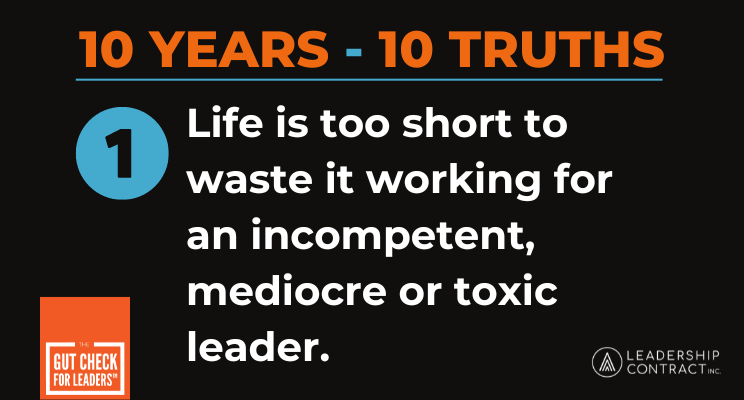10 years – 10 truths
This is the first post in my 10 Years – 10 Truths series.
I’m going to reflect on my decade of helping leaders and organizations scale strong leadership accountability.
In the last few weeks, I’ve led sessions with the senior leaders of two organizations.
In the first group, we discussed the ideas from my book, Accountable Leaders. It was like a conversation you would have with a book club.
The biggest insight these leaders shared was the acknowledgment that they were tolerating mediocrity from their managers and leaders. They also realized the impact that this is having on their employees. They came away with the conviction to begin to tackle this challenge head-on.
In the other session, my team and I were working with a group of leaders who were going through quite a bit of change. They had a new leader who had a compelling vision for the future. She’d replaced a long-standing leader who was simply toxic.
Leadership trauma is all too common
In frank and honest discussions, these leaders talked about having “leadership trauma” from the years of mistreatment, micromanaging, and disrespect shown by this toxic leader.
“Leadership trauma” sounds heavy or even overdramatic. But in my work as a strategic leadership adviser, I’ve seen this play out too many times. It’s heartbreaking and really gets me angry.
One highly confidential project involved conducting interviews with senior executives after a CEO had been fired. The board chair realized this CEO was toxic. In fact, in my conversation with the chair, he said, “He is a sociopath, and this happened on my watch. I must make things better.”
The interviews were unbelievable. Hearing the details of how this leader mistreated and manipulated his leaders was astonishing. No leader, no human being, for that matter, has the right to treat people so poorly.
The top research-based characteristics of mediocre leaders
My research on mediocre leadership identifies five top characteristics that these disappointing leaders demonstrate:
- Blame others. When something goes wrong, they immediately point the finger at someone else. They never personally acknowledge their role in or contribution to any mistake or failure.
- Selfish and self-serving. Mediocre leaders also tend to be profoundly selfish. They act out of self-interest. They bring a sense of entitlement to their roles.
- Uncivil and mean. These leaders regularly mistreat, demean, and bully others. They’re dreadful to work for, and they create tremendous personal stress for those they lead.
- Inept and incompetent. Many mediocre leaders are inept and incompetent – they don’t have the right instincts for leadership. They make bad decisions and leave a trail of disaster behind them. The worst ones are those who are inept but think they are great.
- Lack of initiative. Mediocre leaders are lazy and unwilling to work hard. They look for the easy way out of any situation. They deflect responsibility, or they always stay under the radar, never to be seen or heard.
My research findings also confirmed what I’ve seen in my work with organizations: mediocre leaders are everywhere, and they have a significant negative impact on the people they lead.
The global survey collected hundreds and hundreds of open-ended comments describing the deeply visceral and negative impact of mediocre leaders. As my team and I analyzed the responses, it became quite overwhelming. Here’s one direct quote from a respondent:
“Slowly but surely I feel like I'm dying a little at a time in my job – it's soul-destroying.”
Survey respondent
Is your experience of leadership a soul-destroying one?
Erradicate mediocrity in leadership
Listen, we need to erradicate mediocrity in leadership from our organizations. We need to demonstrate zero tolerance for leaders who are toxic, who abuse, mistreat, and bully their teams.
It’s not that complicated. Organizations everywhere are paying a huge price for their inaction. A lousy leader will never hire the best talent. Alternatively, they may be incapable of even recognizing great talent when they see it. It gets worse – mediocrity will breed mediocrity. A group of mediocre leaders will never sustain high performance – this I know for sure. I’m sure you know this to be true as well.
If you are a senior executive and you sense this is a problem in your organization, then you need to act. Talking about it and doing nothing is irresponsible.
If you happen to be one of these mediocre leaders, you’ll need to be honest with yourself and understand why this is happening. You will also need to decide whether a leadership role is really the right place for you.
If you find yourself working for one of these leaders, you need to find a way to free yourself from this current situation. It may not be easy to do, but you need to consider the impact this is having on your health. You are most likely not at your best as an employee, a spouse, a parent, or a friend.








